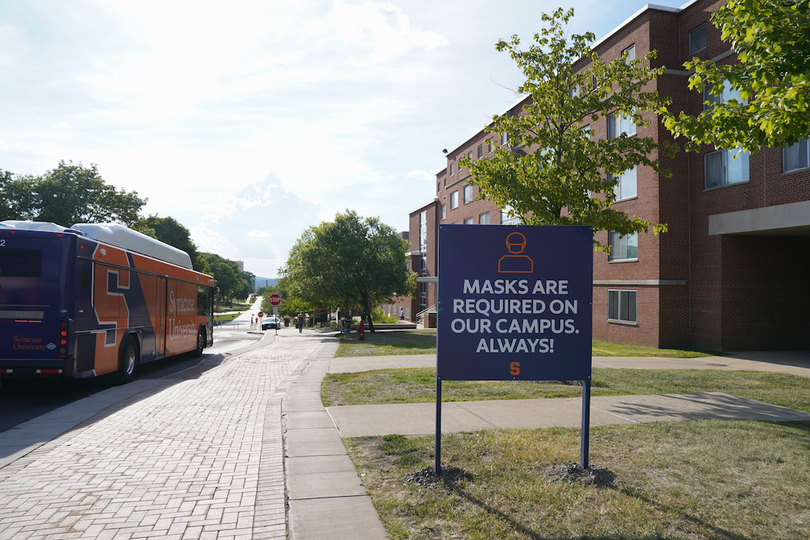SU to reduce environmental impact of COVID-19 response strategy

The university is encouraging students to wash their hands rather than use disposable gloves and wear reusable masks when possible. Emily Steinberger | Photo Editor
The Daily Orange is a nonprofit newsroom that receives no funding from Syracuse University. Consider donating today to support our mission.
Syracuse University has taken steps to make its coronavirus response environmentally friendly, even though its chief focus remains protecting students, university officials said.
To comply with state and national health guidelines, the university is requiring students to wear masks on campus, pick up food from dining halls in disposable containers and practice other sanitary behaviors. While the main purpose of the safety measures is to mitigate the spread of coronavirus on campus, SU is working on ways to make its coronavirus response more sustainable.
To cut down on the number of disposable personal protective products students throw away, SU is encouraging students to wear reusable masks whenever possible and wash their hands or use hand sanitizer instead of wearing gloves, said Christine Weber, public information and internal communications officer for the Office of Campus Safety and Emergency Services, in a statement.
“It takes the whole community to make a sustainable future,” Weber said. “If everyone pitches in and does their part during this time we will have a more sustainable future.”
While dining halls have to utilize disposable containers and utensils this year due to seating constraints, the university is working to determine a way to compost those items, said Mark Tewksbury, the co-director of SU’s Food Services department.
Dining halls are offering biodegradable and compostable containers whenever possible and are working to provide students with reusable bags to carry their food out from the dining halls, said Melissa Cadwell, the sustainability coordinator for SU’s office of energy systems and sustainability management.
Food services is coordinating with the Onondaga County Resource Recovery Agency, which oversees recycling, compost and waste in the area, to ensure the university is taking sustainable coronavirus response measures, Weber said.
Despite the measures the university is taking, Laura Zazyczny, a senior majoring in supply chain management and entrepreneurship and emerging enterprises and president of SU’s chapter of the Food Recovery Network, said she thinks sustainability could have played a greater role in the university’s decision-making. The Food Recovery Network is a national organization that works to eliminate food waste by donating unused food from SU’s dining halls.
“Since getting (personal protective equipment) is a priority, sustainability is put on the backburner and less of a priority in the minds of an administrator that is trying to operate during a pandemic,” Zazyczny said. “If decision-makers are more conscious of how they’re impacting the environment, that sustainability can be achieved.”
In preparation for the return of students to campus for the fall semester, the university purchased over 3 million disposable masks and 35,000 reusable cloth masks, according to a SU News release.
While the coronavirus pandemic does pose sustainability challenges for SU, students can reduce the virus’ environmental impact by making sustainability a part of their daily life, Cadwell said.
“Our campus community can help continue to make our campus as sustainable as possible,” Cadwell said. “If everyone pitches in and does their part during this time, we will have a more sustainable future.”





